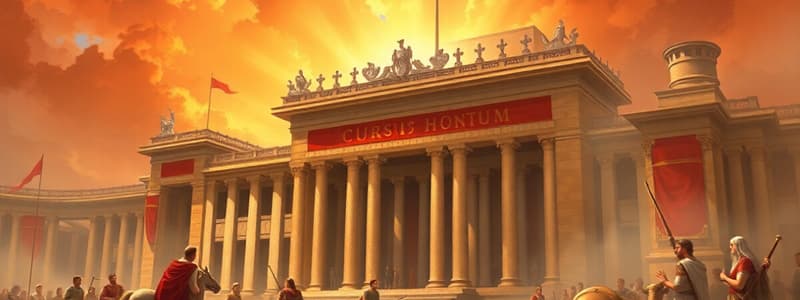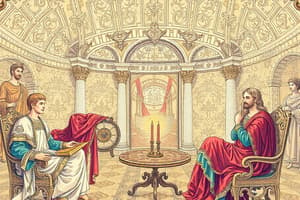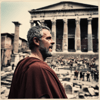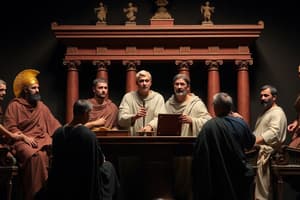Podcast
Questions and Answers
What was the primary function of the Senate in the Roman Republic?
What was the primary function of the Senate in the Roman Republic?
- To enact legislation and enforce laws
- To provide advice to the kings and consuls (correct)
- To lead military campaigns
- To convene assemblies for citizen voting
The Cursus Honorum allowed ambitious Romans to hold various political offices in any order they chose.
The Cursus Honorum allowed ambitious Romans to hold various political offices in any order they chose.
False (B)
What significant event marked the emergence of the Roman Republic?
What significant event marked the emergence of the Roman Republic?
The overthrow of the Etruscan monarchy in 509 BCE
In the early Roman state, the ______ was the highest authority and had absolute power.
In the early Roman state, the ______ was the highest authority and had absolute power.
Match the following terms with their definitions:
Match the following terms with their definitions:
What role did assemblies play in the Roman political system?
What role did assemblies play in the Roman political system?
The decline of republican values in Rome signaled a move towards absolute power held by individuals.
The decline of republican values in Rome signaled a move towards absolute power held by individuals.
Which magistracy was the first step on the Cursus Honorum?
Which magistracy was the first step on the Cursus Honorum?
The Tribuneship of the Plebs was created to empower the patricians.
The Tribuneship of the Plebs was created to empower the patricians.
What power did the Tribunes have regarding laws proposed by the patricians?
What power did the Tribunes have regarding laws proposed by the patricians?
The Aedileship was responsible for maintaining the city's ________ and public entertainment.
The Aedileship was responsible for maintaining the city's ________ and public entertainment.
Match the following magistracies with their primary responsibilities:
Match the following magistracies with their primary responsibilities:
At what age was membership to the Senate typically achieved through the Quaestorship?
At what age was membership to the Senate typically achieved through the Quaestorship?
The Praetorship was the lowest elected official position in the Roman magistracies.
The Praetorship was the lowest elected official position in the Roman magistracies.
What does the term 'sacrosanct' mean in relation to the Tribunes?
What does the term 'sacrosanct' mean in relation to the Tribunes?
The Cursus Honorum represents a strict ________ in Roman political life.
The Cursus Honorum represents a strict ________ in Roman political life.
What was the primary purpose of the Cursus Honorum in the Roman Republic?
What was the primary purpose of the Cursus Honorum in the Roman Republic?
The Cursus Honorum allowed aspiring politicians to directly ascend to the position of emperor without any prior experience.
The Cursus Honorum allowed aspiring politicians to directly ascend to the position of emperor without any prior experience.
Who marked the transition to the Roman Empire?
Who marked the transition to the Roman Empire?
The Cursus Honorum played a crucial role in maintaining the __________ of the Roman political system.
The Cursus Honorum played a crucial role in maintaining the __________ of the Roman political system.
What was a result of the emphasis on the Cursus Honorum in Roman society?
What was a result of the emphasis on the Cursus Honorum in Roman society?
The Cursus Honorum was structured to centralize power in a single individual.
The Cursus Honorum was structured to centralize power in a single individual.
What did the Cursus Honorum ensure about political qualifications?
What did the Cursus Honorum ensure about political qualifications?
The Cursus Honorum provided a framework for individuals to demonstrate their commitment to the state and their willingness to take on __________.
The Cursus Honorum provided a framework for individuals to demonstrate their commitment to the state and their willingness to take on __________.
Match the following aspects of the Cursus Honorum with their descriptions:
Match the following aspects of the Cursus Honorum with their descriptions:
Flashcards
Cursus Honorum
Cursus Honorum
A traditional path to political advancement in the Roman Republic.
Roman Kings
Roman Kings
Single monarchs in early Rome, holding absolute power.
Roman Senate (SPQR)
Roman Senate (SPQR)
Advisory body of prominent citizens in the Roman Republic.
Roman Assemblies
Roman Assemblies
Signup and view all the flashcards
Etruscan Monarchy
Etruscan Monarchy
Signup and view all the flashcards
Roman Republic
Roman Republic
Signup and view all the flashcards
Magistrates
Magistrates
Signup and view all the flashcards
Cursus Honorum
Cursus Honorum
Signup and view all the flashcards
Magistracies
Magistracies
Signup and view all the flashcards
Quaestorship
Quaestorship
Signup and view all the flashcards
Tribuneship of the Plebs
Tribuneship of the Plebs
Signup and view all the flashcards
Power of Veto
Power of Veto
Signup and view all the flashcards
Aediles
Aediles
Signup and view all the flashcards
Praetorship
Praetorship
Signup and view all the flashcards
Roman Republic
Roman Republic
Signup and view all the flashcards
Hierarchy
Hierarchy
Signup and view all the flashcards
Cursus Honorum
Cursus Honorum
Signup and view all the flashcards
Roman Republic
Roman Republic
Signup and view all the flashcards
Augustus
Augustus
Signup and view all the flashcards
Balance of Power
Balance of Power
Signup and view all the flashcards
Social Mobility
Social Mobility
Signup and view all the flashcards
Despotism
Despotism
Signup and view all the flashcards
Leadership Development
Leadership Development
Signup and view all the flashcards
Democratic Principles
Democratic Principles
Signup and view all the flashcards
System of Offices(Cursus Honorum)
System of Offices(Cursus Honorum)
Signup and view all the flashcards
Study Notes
The Cursus Honorum
- The Cursus Honorum was a traditional path of political advancement in the Roman Republic
- It was a sequence of magistracies ambitious Romans sought to hold
- Each position had specific qualifications and responsibilities
- Holding offices in the correct order was crucial for influence and prestige
Order of Offices
- The Cursus Honorum was a traditional sequence of magistracies
- Ambitious Romans strived to hold these positions
Required Experience
- Holding each office in sequence provided valuable experience
- It prepared individuals for higher positions
Constitutional Framework
- The Cursus Honorum helped ensure stability and order in the Roman Republic
Earliest Roman Magistracies
- Kings: Ruled the city and surrounding countryside, held absolute power, responsible for military, laws, and administration
- Senate (SPQR): Advisory body of prominent citizens, had no formal lawmaking power, but their advice was respected
- Assemblies: Gatherings of citizens who voted on various matters, had limited initial power that increased over time
The Rise of the Republican System
- The Roman Republic emerged after the overthrow of the Etruscan monarchy in 509 BCE
- The new system was based on principles of checks and balances
- It had a complex system of institutions and offices
Magister
- Magister Tavenner is the author
The Offices of the Cursus Honorum: Magistracies
- Citizens wielded power through prestigious magistracies with specific duties
- Roles followed a strict hierarchy known as the cursus honorum
The Offices of the Cursus Honorum: Elected
- Roman citizens elected magistracies.
- This ensured the voice of the people was heard
The Offices of the Cursus Honorum: Hierarchy
- The Roman political landscape had a structured hierarchy
- The Cursus Honorum system was meticulously arranged
The Quaestorship
-
The Quaestorship was the first step in the Cursus Honorum
-
It was typically held by men at the age of 32
-
Members were traditionally part of the Senate
-
Financial administration was a primary duty.
-
Military service involved overseeing military finances and supplies
-
The Quaestorship provided valuable experience in administration and public life, preparing future officials for higher offices
The Tribuneship of the Plebs
- The Tribuneship was formed after 509 BCE to protect the plebeians from noble exploitation
- Tribunes were sacrosanct, meaning they could not be harmed
- They had the power to veto any law or action proposed by the patricians
Aediles
- Curule Aediles were elected officials
- They had the privilege of sitting on a curule chair, which symbolized their authority
- They were responsible for oversight of games, festivals, and public entertainment
The Praetorship
- Praetors were the highest elected official after the consuls
- They had the authority to adjudicate civil cases and to command armies in wartime
- The urban praetor administered justice in Rome, while provincial praetors governed the provinces
- The Praetorship grew in importance as the Roman State expanded, with a corresponding increase in the number of praetors.
- Praetors issued edicts that defined their legal jurisdiction, helping to shape Roman law
Consuls
- Consuls were the highest magistracy, with two elected annually
- They had primary responsibility for military command, including summoning the legions to battle
- They presided over the Senate, called assemblies, and had significant executive power
The Censorship
- Censors were former consuls appointed for five years
- They conducted a census of the Roman population
- They had broad moral authority to assess citizens' behavior and punish those lacking virtue
- They were responsible for awarding public contracts and overseeing Senate membership
Dictators
- Dictators were emergency officials appointed for a maximum of six months
- They were given near-absolute power during times of crisis, such as war or civil unrest
- Their power was limited by the time constraints of their terms and the overall legal framework
The Cursus Honorum in Practice
- The Cursus Honorum was a training ground for future leaders in the Roman Republic that facilitated social mobility
- This was because a clear path to power and influence allowed individuals from varied backgrounds to advance
- This helped to maintain stability as new leaders were constantly being groomed
The Decline of the Cursus Honorum
- Powerful generals used personal loyalty to manipulate the political system for their own benefit
- The emphasis on personal ambition, military power, and wealth eroded traditional republican values and norms
- The reign of Augustus marked the transition to the Roman Empire, ending the Republic and the system of offices entirely
Lessons from the Cursus Honorum
- The Cursus Honorum provided a structured pathway to leadership
- It fostered experience, ensured qualifications, and balanced powers among individuals
- The system encouraged civic engagement, fostered social mobility, and maintained stability, but also could be affected by corruption and eventually led to the end of the Republic
Studying That Suits You
Use AI to generate personalized quizzes and flashcards to suit your learning preferences.
Related Documents
Description
Explore the traditional path of political advancement known as the Cursus Honorum. This quiz delves into the sequence of magistracies sought by ambitious Romans, their responsibilities, and the importance of holding offices in the correct order for attaining influence. Understand how this framework contributed to the stability of the Roman Republic.





